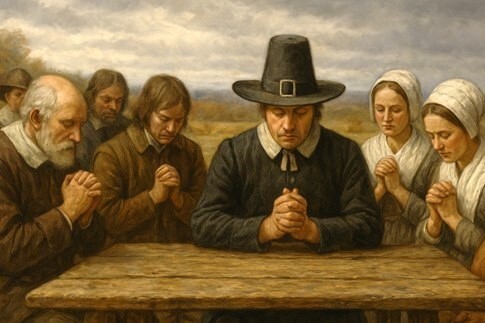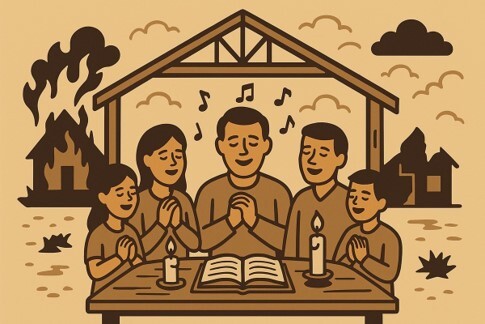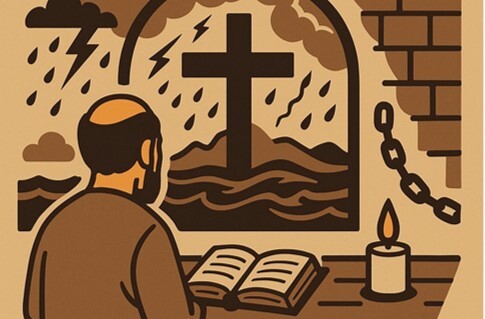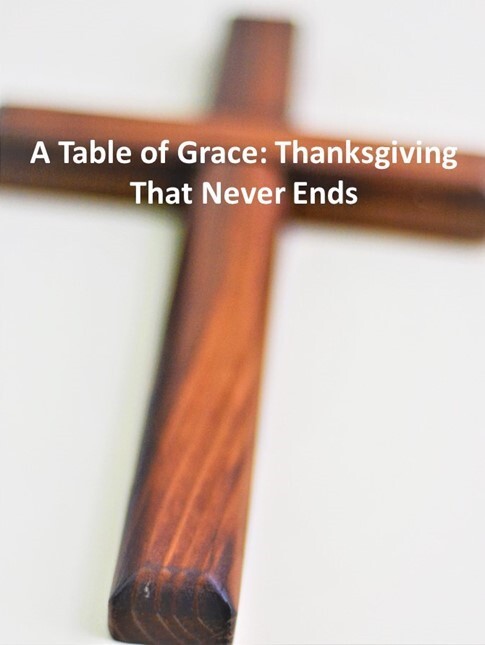Greetings in the name of the Father, the son, and the Holy Spirit.
“Enter His gates with thanksgiving
and His courts with praise;
give thanks to Him and praise His name.
For the Lord is good and His love endures forever;” – Psalm 100:4–5
and His courts with praise;
give thanks to Him and praise His name.
For the Lord is good and His love endures forever;” – Psalm 100:4–5
Thanksgiving is around the corner. We look back and give thanks for this year — for moments of joy, milestones reached, and quiet mercies we might have missed along the way. But not everyone’s year has been easy. Some are walking into this season with an empty chair at the table. Others carry the weight of a job lost, a friendship broken, or a prayer still unanswered.
And yet, the sun sets and the sun rises again, and the calendar turns once more to Thanksgiving. It invites us — all of us — to pause and remember.
When the Puritans came to this land, they faced a year of cold, sickness, and hunger. Half of them did not survive that first brutal winter. But when the harvest finally came, they gathered around a rough wooden table and gave thanks to God — not because everything had gone well, but because God had carried them through.
It wasn’t their strength or their skill that sustained them. It was grace. God’s unseen hand had guided them across the ocean, provided help from the native people, and given them enough to begin again. That first Thanksgiving was more than a meal — it was a declaration of faith: “The Lord has brought us this far.”
Today, as we gather in homes, around tables filled with food and faces we love, we are invited to that same kind of gratitude — a gratitude that goes deeper than comfort, that stands firm even in hardship, and that finds its reason not in the gifts, but in the Giver.
There are three kinds of Thanksgiving I want to share with you today.
1. Thanksgiving Because Good Things Happened
The first kind of thanksgiving is the one we know best — when good things happen. It’s the kind that rises naturally when blessings come, prayers are answered, or storms finally pass.
You were sick — and now you’re healed.
You were unemployed — and the job finally came.
You were worried — and the burden lifted.
You prayed for a door to open — and it did.
When life brings relief or blessing, gratitude flows easily. And it should. Scripture reminds us repeatedly to give thanks for what God has done. Psalm 103 declares:
“Praise the Lord, my soul,
and forget not all His benefits —
who forgives all your sins
and heals all your diseases,
who redeems your life from the pit
and crowns you with love and compassion.” (Psalm 103:2–4)
Thankfulness begins by remembering. It is the act of pausing long enough to recognize that the good in our lives did not arrive by accident. Every breath, every answered prayer, every morning we wake to new mercies is a gift.
James 1:17 reminds us,
“Every good and perfect gift is from above, coming down from the Father of the heavenly lights, who does not change like shifting shadows.”
But in our fast-paced world, even this simple act of gratitude has become rare. We live in an age where success is expected and blessings are often seen as ordinary. Many receive much, but few stop to whisper, “Thank You, Lord.”
In the Gospels, there’s a story that pierces the heart. Ten men with leprosy cried out to Jesus for healing. He told them to go and show themselves to the priests, and as they went, they were healed. But only one — a Samaritan, an outsider — turned back to thank Him.
“One of them, when he saw he was healed, came back, praising God in a loud voice. He threw himself at Jesus’ feet and thanked Him — and he was a Samaritan.” (Luke 17:15–16)
Jesus asked, “Were not all ten cleansed? Where are the other nine?” (v. 17)
Nine received healing, but only one received the deeper gift — the joy of knowing the Healer. Gratitude does something to the soul. It softens the heart and opens our eyes to see God’s presence in everyday life. Without it, blessings fade into background noise, unnoticed and uncelebrated.
Thanksgiving should never become mechanical or seasonal. It’s meant to be a rhythm — a way of living that constantly points back to the Source of every good thing.
As Psalm 107:1 says,
“Give thanks to the Lord, for He is good; His love endures forever.”
So yes, when good things happen — give thanks. Celebrate, rejoice, and testify of God’s goodness. But remember: this is only the beginning of gratitude. True thanksgiving goes deeper. It’s not only about blessings received, but about the One who blesses.
The next level of thanksgiving is not born in comfort but in trust — when nothing changes, yet our hearts still choose to praise Him.
2. Thanksgiving When Nothing Changes — Or Even Gets Worse
There’s a harder kind of gratitude, one that grows in the soil of pain and disappointment. It’s the kind that looks at an unchanging situation — or even one that’s getting worse — and still says, “God is good.”
This is not the easy thanksgiving that follows answered prayer. It is the deeper kind that rises from faith when the evidence around us says otherwise. It is praise born not from comfort, but from conviction — the conviction that God remains faithful even when life is not.
The prophet Habakkuk lived through such days. His nation was collapsing, crops had failed, and the livestock were gone. Every visible sign of hope had vanished. Yet he wrote one of the most remarkable confessions of faith in Scripture:
“When the fig tree does not bud,
and there are no grapes on the vines;
when the olive trees do not produce
and the fields yield no crops;
when the sheep disappear from the pen
and there are no cattle in the stalls—
I will rejoice because of the Lord;
I will be happy because of the God who delivers me!
The Sovereign Lord is my source of strength.” (Habakkuk 3:17–19)
Nothing had improved. The fields were still empty, and the barns still bare. But Habakkuk found a reason to sing — not because his world changed, but because he knew the One who never does.
That is faith at its purest — the faith that says, “Even if I have nothing, I still have God, and He is enough.”
We see the same spirit in Job, who, after losing everything, fell to the ground in worship and said,
“The Lord gave and the Lord has taken away; may the name of the Lord be praised.” (Job 1:21)
Job’s faith didn’t ignore the pain; it trusted God through it. He couldn’t see the purpose behind his suffering, but he clung to the truth of God’s goodness.
There’s a story told of a family in a small town whose house burned to the ground. The father stood before the ashes, the air was still filled with smoke, as neighbors came with tears and silence. Finally, he said softly, “We’ve lost our house, but not our hope. We can rebuild walls, but only God can rebuild hearts.”
Months later, that same family celebrated Thanksgiving in the frame of their unfinished home — bare beams, no flooring, candles for light. But around that rough wooden table, they sang, “Great Is Thy Faithfulness.”
That is what it means to give thanks when nothing changes — to anchor your joy not in what is seen, but in Who is unseen.
Paul understood this when he wrote from prison,
“Give thanks in all circumstances; for this is God’s will for you in Christ Jesus.” (1 Thessalonians 5:18)
Notice — in all circumstances, not for all. Gratitude does not deny the pain; it declares that pain will not have the final word.
Like Habakkuk and Paul, we discover that real thanksgiving is not the result of strength we muster, but strength God supplies.
“The Lord is my rock, my fortress, and my deliverer… my stronghold.” (Psalm 18:2)
When everything else shakes, He remains our solid ground — our song in the storm, our reason to rejoice when nothing else makes sense.
3. Thanksgiving Because of Who God Is
The deepest kind of thanksgiving is not about what we have, or even what we’ve lost — it’s about who God is.
When Job lost his children, his home, and his health, he fell to the ground and worshiped, saying:
“The Lord gave and the Lord has taken away;
may the name of the Lord be praised.” (Job 1:21)
Job’s gratitude wasn’t built on outcomes. His world had collapsed, yet his worship rose higher than his pain. His praise was rooted in God’s unchanging character — His mercy, His sovereignty, His steadfast love.
This is the summit of thanksgiving: when the heart realizes that God Himself is the greatest gift. When blessings fade and prayers seem unanswered, God’s presence still fills the room.
David understood this truth when he wrote:
“The Lord is my shepherd, I lack nothing.” (Psalm 23:1)
Even in “the valley of the shadow of death,” David found peace — not because the valley disappeared, but because the Shepherd walked beside him. Real thanksgiving flows from that awareness: God is with me.
The Apostle Paul expressed the same truth from a prison cell:
“I know what it is to be in need, and I know what it is to have plenty.
I have learned the secret of being content in any and every situation …
I can do all this through Him who gives me strength.” (Philippians 4:12-13)
Paul’s gratitude didn’t depend on freedom or comfort. He rejoiced because Christ was enough. When everything else is taken away, what remains is often what matters most — God’s presence, steady and sure.
Sometimes we think thanksgiving comes after the storm passes. But the miracle is when the storm still rages, and yet peace settles in our hearts. That peace doesn’t come from denial or positive thinking; it comes from knowing the One who commands the wind and waves. Jesus Himself said:
“Peace I leave with you; My peace I give you.
I do not give to you as the world gives.
Do not let your hearts be troubled and do not be afraid.” (John 14:27)
That kind of peace gives birth to worship in the middle of chaos. It’s the song that rises while tears still fall — the thanksgiving that springs from faith, not from sight.
A man named Ludwig van Beethoven began to lose his hearing. For a composer, silence could have meant the end. Yet from that silence emerged one of the greatest musical triumphs in history — his Ninth Symphony, the Ode to Joy.
Completely deaf, Beethoven never heard the orchestra that performed his masterpiece. At its premiere, he stood conducting, unaware of the thunderous applause behind him, until someone gently turned him to see the crowd rising to its feet.
Joy came out of silence. Music came out of suffering. Hope came out of what the world called failure.
That is the essence of thanksgiving — not the noise of celebration when life is easy, but the quiet song of faith that keeps playing even when the world grows silent.
After all, at the center of all true thanksgiving is grace. We thank God not merely because He gives, but because He gave — His Son, Jesus Christ.
Before feeding the five thousand, Jesus gave thanks.
Before raising Lazarus, He gave thanks.
And on the night before His crucifixion, knowing the cross was near, He took bread, gave thanks, and broke it.
How astonishing — to give thanks with nails awaiting His hands.
But Jesus knew that thanksgiving is not about what’s on the table; it’s about who’s at it. The Father was with Him, and that was enough.
Through His death and resurrection, He opened a new way for us to live anchored not in circumstance but in eternal love.
Paul captured it perfectly:
“Thanks be to God for His indescribable gift!” (2 Corinthians 9:15)
Thanksgiving, then, is not a date on the calendar — it’s a posture of the soul that has met grace and found it sufficient. When we know who God is — unchanging, merciful, near — every day becomes Thanksgiving.
Summary: A Table That Unites Us All
As Thanksgiving approaches, you may find yourself in one of three places:
Grateful because something good has happened.
Waiting faithfully though nothing has changed.
Or resting in quiet trust, believing God for who He is.
Wherever you are, you are not alone. The same God who sat with the Pilgrims at their rough wooden table sits with you at yours. The same God who carried Habakkuk through famine, Job through sorrow, and Paul through prison holds your life in His loving hands today.
This season reminds us that gratitude is not about what’s on the table, but about who’s at it. Our thanksgiving is not built on perfect circumstances, but on a perfect Savior. Because of Jesus, there is always a reason to give thanks — in joy, in sorrow, in plenty, or in need.
“Let them give thanks to the Lord for His unfailing love
and His wonderful deeds for mankind.” (Psalm 107:8)
The world may change, but His love does not. The storms may come, but His mercy endures forever. When we gather to give thanks, our hearts join a table far bigger than our own — one that stretches through generations and across nations, bound together by grace.
So as you gather this year — whether your table is surrounded by laughter or touched with loss — may you see God’s presence in every face and His goodness in every breath.
And when the plates are cleared and the house grows still, may your heart whisper the truest thanksgiving:
“You, Lord, are enough.”
Let’s pray together.
Gracious Father,
we thank You for Your goodness that never fades,
for mercies new every morning,
and for Your faithfulness through every season.
For the harvests gathered, we give You thanks.
For the prayers still waiting to be answered, we trust You.
For the storms that have not yet calmed, we praise You still.
Teach us, Lord, to see Your hand in all things —
to rejoice when blessings come,
and to rest when they don’t.
Let our hearts echo the words of Habakkuk,
“Though the fig tree does not bud… yet I will rejoice in the Lord.”
Make our homes and our lives tables of grace,
where gratitude flows and hope endures.
In the name of Jesus Christ,
the Giver of every good gift,
we pray. Amen.
“Rejoice always,
pray continually,
give thanks in all circumstances;
for this is God’s will for you in Christ Jesus.” – 1 Thessalonians 5:16–18
pray continually,
give thanks in all circumstances;
for this is God’s will for you in Christ Jesus.” – 1 Thessalonians 5:16–18





